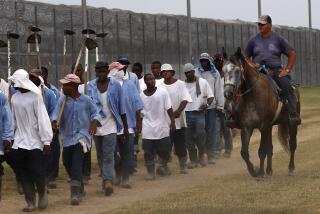Not Forgotten, Never Crushed
- Share via
“They tried to instill into our minds that we would be forgotten in a few years’ time,” said a black South African, a former political prisoner. “They did everything to crush our morale.”
The “they” in this case are the South African authorities, and they failed completely in their attempt to break the spirit of their political prisoners or the popular black equality movement they represent. African National Congress leader Walter Sisulu and seven other South African political prisoners are free from confinement, although their liberation is far from complete. Their recent prison release, a gesture by the white minority government toward negotiations with the black majority, provided them the opportunity to tell the world about their lives behind the walls of Robben Island, South Africa’s version of Alcatraz, and Pollsmoor Prison in Cape Town.
After Sisulu, still-imprisoned ANC leader Nelson Mandela and others were convicted of conspiring to sabotage and overthrow the minority government, they were put to work at hard labor. That meant breaking big rocks into small rocks with a hammer, as a large guard with a swastika tattoo looked on. After a day at hard labor, they had to strip naked outdoors and wash down with cold sea water; black prisoners had to work in short pants and without socks, even in the dead of winter.
Later, the prisoners fought back through hunger strikes and work stoppages and won concessions from prison authorities. Robben Island and Pollsmoor provided an excellent political education, former prisoner Ahmed Kathrada said, because they “really confirmed our belief that the South African authorities do not suddenly undergo a change of heart . . . nothing is done without pressure.”
Their countrymen outside never forgot them, as South African authorities had vainly hoped some 25 years ago. The freed prisoners emerged, morale uncrushed, and were greeted with joyful sobs from South Africans who were not even born when they were locked away. Largely cut off from communication with the outside world, they spent a generation of darkness in prison--but they can be proud of the light they have helped to shine on South Africa.
More to Read
Sign up for Essential California
The most important California stories and recommendations in your inbox every morning.
You may occasionally receive promotional content from the Los Angeles Times.













